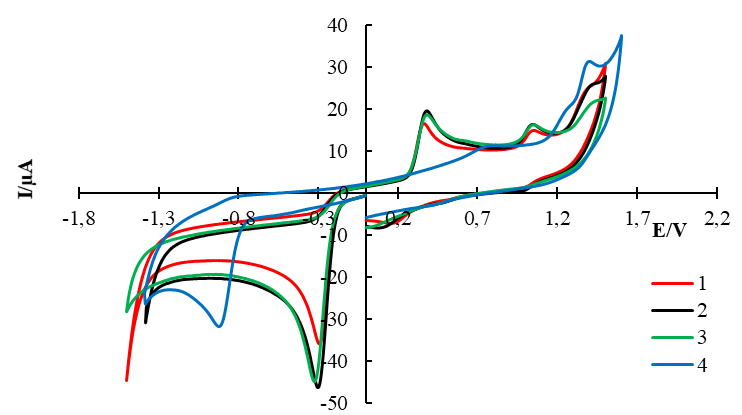
The electrochemical behavior’s character of a potential antiviral drug 3-nitro-4-hydroxy-7-methylthio-4H-[1,2,4]triazolo[5,1-c][1,2,4]triazinide monohydrate
Abstract
Keywords
Full Text:
PDFReferences
Fuchi Y, Murase H, Kai R, Kurata K, Karasawa S, Sasaki S. Artificial host molecules to covalently capture 8-Nitro-cGMP in neutral aqueous solutions and in cells. Bioconjug Chem. 2021;32(2):385–393. doi:10.1021/acs.bioconjchem.1c00012
Kedderis GL, Miwa GT. The metabolic activation of nitroheterocyclic therapeutic agents. Drug Metab Rev. 1988;19(1):33–62. doi:10.3109/03602538809049618
Wardman P. Application of pulse radiolysis methods to study the reactions and structure of biomolecules. Rep Prog Phys. 1978;21(2):259–298. doi:10.1088/0034-4885/41/2/002
Robins RK, Revankar GR, O'Brien DE, Springer RH, Albert TNA, Senga K, Miller JP, Streeter DG. Purine analog inhibitors of xanthine oxidase‐structure activity relationships and proposed binding of the molybdenum cofactor. J Heterocycl Chem. 1985;22(3):601–634. doi:10.1002/jhet.5570220303
Rusinov VL, Ulomskii EN, Chupakhin ON, Charushin VN. Azolo [5, 1-c]-1, 2, 4-triazines as a new class of antiviral compounds. Russ Chem Bull. 2008;57(5):985–1014. doi:10.1007/s11172-008-0130-8
Verbitskiy EV, Rusinov GL, Charushin VN. Development of new antituberculosis drugs among of 1,3- and 1,4-diazines. Highlights and perspectives. Russ Chem Bull. 2019;68(12):2172–2189. doi:10.1007/s11172-019-2686-x
Clercq E. Antiviral drugs: current state of the art. J Clin Virol. 2001;22(1):73–89. doi:10.1016/S1386-6532(01)00167-6
Rusinov VL, Charushin VN, Chupakhin ON. Biologically active azolo-1,2,4-triazines and azolopyrimidines. Russ Chem Bull. 2018;67(4):573–599. doi:10.1007/s11172-018-2113-8
Spasov AA, Babkov DA, Sysoeva VA, Litvinov RA, Shamshina DD, Chupakhin ON, Rusinov VL, Ulomsky EN, Savateev KV, Fedotov VV, Slepukhin PA, 6-Nitroazolo[1,5-a]pyrimidin-7(4H)-ones as Antidiabetic Agents. Arch Pharm (Weinheim, Ger). 2017;350(12):1–12. doi:10.1002/ardp.201700226
Sologub TV, Tokin II, Midikari AS; Tsvetkov VV. A comparative efficacy and safety of using antiviral drugs in therapy of patients with influenza. Infektsionnye Bolezni. 2017;15(3):25–32. doi:10.20953/1729-9225-2017-3-25-32
Lioznov DA, Tokin II, Zubkova TG, Sorokin PV. The practice of using a domestic antiviral drug in the etiotropic therapy of acute respiratory viral infection. Ter Arkhiv (Ter Arkh). 2020;92(12):59–63. doi:10.26442/00403660.2020.12.200427
Kasyanenko KV, Kozlov KV, Maltsev OV, Lapikov II, Gordienko VV, Sharabhanov VV, Sorokin PV, Zhdanov KV. Evaluation of the effectiveness of Riamilovir in the complex therapy of patients with COVID-19. Ter Arkhiv. 2021;93(3):291–295. doi:10.26442/00403660.2021.03.200719
Sabitov AU, Sorokin PV, Dashutina SY. Experience of the preventive use of the drug Riamilovir in the foci of coronavirus infection (COVID-19). Ter Arkhiv. 2021;93:435–439. doi:10.26442/00403660.2021.04.200751
Kulkarni DR, Malode SJ, Prabhu KK, Ayachit NH, Kulkarni RM, Shetti NP. Development of a novel nanosensor using Ca-doped ZnO for antihistamine drug. Mater Chem Phys. 2020;246:122791. doi:10.1016/j.matchemphys.2020.122791
Bukkitgar SD, Shetti NP, Kulkarni RM, Nandibewoor ST. Electro-sensing base for mefenamic acid on 5% barium-doped zinc oxide nanoparticles modified electrode and its analytical application. RSC Adv. 2015;5(127):104891–104899. doi:10.1039/C5RA22581G
Shetti NP, Malode SJ, Nandibewoor ST. Electro-oxidation of captopril at a gold electrode and its determination in pharmaceuticals and human fluids. Analyt Method. 2015;7(20):8673–8682. doi:10.1039/c5ay01619c
Shetti NP, Nayak DS, Malode SJ, Kulkarni RM, Nano molar detection of acyclovir, an antiviral drug at nanoclay modified carbon paste electrode. Sensing Bio-sensing Res. 2017;14:39–46. doi:10.1016/j.sbsr.2017.04.004
Ivoilova AV, Mikhal’chenko LV, Tsmokalyuk AN, Kozitsina AN, Ivanova AV, Rusinov VL. Redox conversions of new antiviral drug Triazavirin®: Electrochemical study and ESR spectroscopy. Russ Chem Bull. 2021;70(6):1099–1108. doi:10.1007/s11172-021-3190-7
Ivoilova AV, Mikhal’chenko LV, Tsmokalyuk AN, Leonova MY, Lalov A, Mozharovskaia PN, Kozitsina AN, Ivanova AV, Rusinov VL. Redox Conversions of 5-Methyl-6-nitro-7-oxo-4, 7-dihydro-1, 2, 4triazolo [1, 5-a] pyrimidinide L-Arginine monohydrate as a promising antiviral drug. Molec. 2021;26:5087–5093. doi:10.3390/molecules26165087
Britton HTS, Robinson RA. CXCVIII. Universal buffer solutions and the dissociation constant of veronal. J Chem Soc (Resumed). 1931:1456–1462. doi:10.1039/JR9310001456
Squella JA, Bollo S, Núñez-Vergara LJ. Recent developments in the electrochemistry of some nitro compounds of biological significance. Curr Org Chem. 2005;9:565–581 doi:10.2174/1385272053544380
Budnikov GK, Maistrenko VN, and Vyaselev MR, Osnovy sovremennogo elektrokhimicheskogo analiza (Fundamentals of Modern Electrochemical Analysis), Moscow: Mir: Binom LZ, 2003, 592 pp.
Zenkov K, Lankin VZ, Menshikova EB. Okislitel´nyi stress. Biokhimicheskie i patofi ziologicheskie aspekty [Oxidative Stress. Biochemical and Pathophysiological Aspects], MAIK Nauka/Interperiodika. 2001, 343 pp.
Buffinton GD, Christen S, Peterhans E, Stocker R. Oxidative stress in lungs of mice infected with influenza A virus. Free Radic Res Commun. 1992;16(2):99–110. doi:10.3109/10715769209049163
Scholz F, Bond AM, Compton RG. Electroanalytical Methods. Guide to experiments and application. Springer: Berlin, Germany, 2002, 82 p.
Gupta VK, Jain R, Radhapyari K, Jadon N, Agarwal S. Voltammetric techniques for the assay of pharmaceuticals—a review. Analyt Biochem. 2011;408(2):179. doi:10.1016/j.ab.2010.09.027
Levich VG. Fiziko-himicheskaya gidrodinamika [Physical and chemical hydrodynamics]. Moscow, GIFML Publ, 1959. 700 p
Lu SF, Wu KB, Dang XP, Hu SS. Electrochemical reduction and voltammetric determination of metronidazole at a nanomaterial thin film coated glassy carbon electrode. Talanta. 2004;63(3):653–657. doi:10.1016/j.talanta.2003.12.005
DOI: https://doi.org/10.15826/chimtech.2022.9.4.26
Copyright (c) 2022 Polina N. Mozharovskaia, Alexandra V. Ivoilova, Roman A. Drokin, Alla V. Ivanova, Alisa N. Kozitsina, Vladimir L. Rusinov

This work is licensed under a Creative Commons Attribution 4.0 International License.
Chimica Techno Acta, 2014–2025
eISSN 2411-1414
Copyright Notice







